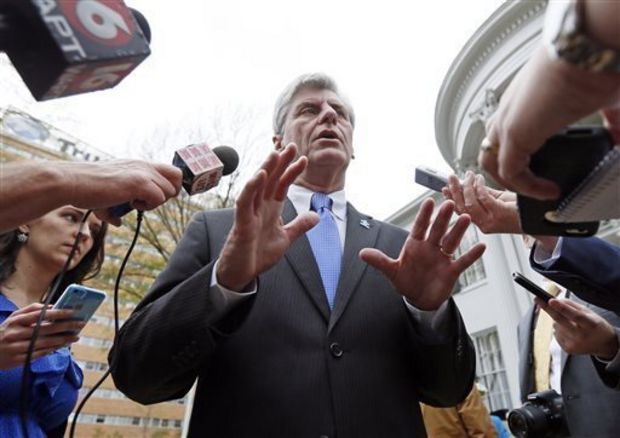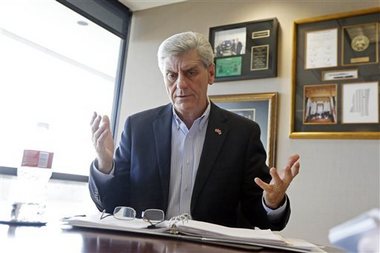

JACKSON, Mississippi (AP) — Republican Gov. Phil Bryant on Wednesday signed three bills to limit union activities in Mississippi, saying he hopes they strengthen the state’s reputation as a place where organized labor has little influence.
“Just to be blunt about it: We just don’t want unions involved in our businesses or our public sector,” Bryant told reporters after he signed the bills, which become law July 1.
Mississippi AFL-CIO president Robert Shaffer said in March that the bills will hurt low-wage workers.
The U.S. Bureau of Labor Statistics shows that 3.7 percent of Mississippi workers were union members in 2013, the most recent number available. That’s one of the lowest rates in the nation.
House Speaker Philip Gunn, three other Republican lawmakers, a lobbyist and a U.S. Chamber of Commerce representative posed for pictures with Bryant as he signed the bills in his Capitol office.
Senate Bill 2473 makes it illegal to coerce a business into staying neutral in a union drive. It also says any decision by workers to unionize must be done by secret ballot.
Senate Bill 2653 says picketing is legal as long as it is nonviolent and doesn’t block entrances. It also simplifies the process of getting a court stop order against picketing.
Senate Bill 2797 says if any state or local government entity wants to use unionized labor on a project, it would have to get permission from the Legislature.
Calls to the AFL-CIO office went unanswered Wednesday after the bill signing. When legislators were debating the bills in March, Shaffer said he was concerned state officials would try to use them to prevent companies recruited by the Mississippi Development Authority from using union labor to build their plants.
Bryant said that Mississippi’s low rate of union membership is “absolutely” a selling point for the state as it tries to lure businesses.
Rep. Jerry Turner, R-Baldwyn, one of the lawmakers at the governor’s ceremony, said the bills are “pre-emptive” because union activity is already rare in Mississippi.
“Our job as legislators and as state government is to create jobs,” Turner said. “And the sequence that that always goes in. Jobs are created and then come the unions. It’s never the unions and then the jobs.”



